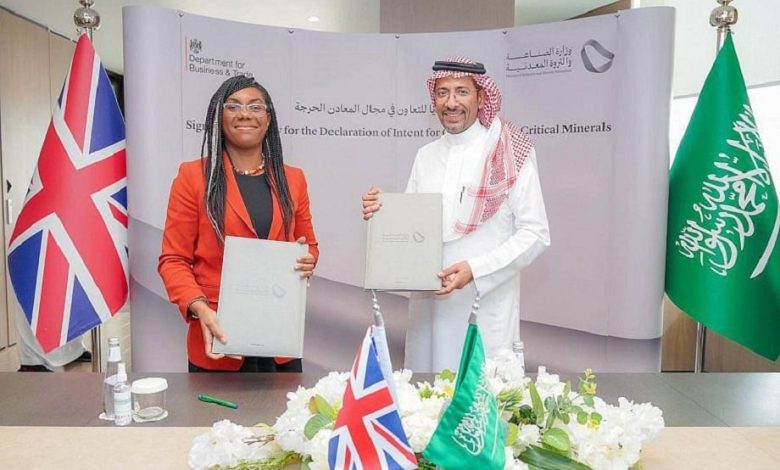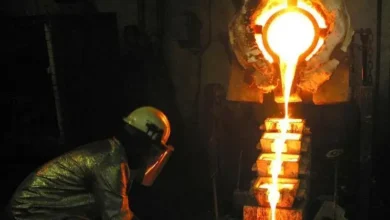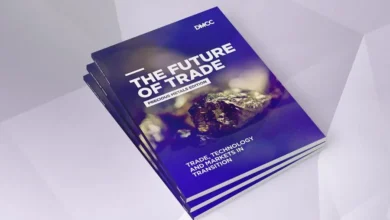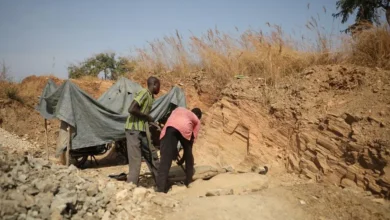
The UK and Saudi Arabia signed a declaration of intent to jointly develop resilient and responsible critical mineral supply chains.
The United Kingdom’s secretary of state for business and trade, Kemi Badenoch was in Riyadh, Saudi Arabia on the second leg of her travel across some GCC countries as she works to advance a regional and comprehensive trade deal.
The British trade minister met with Bandar Al Khorayef, the Saudi minister of Industry and Mineral Resources. The meeting culminated in the signing of a declaration of intent which solidified the two countries’ commitment to jointly develop resilient and responsible critical mineral supply chains in support of the global energy transition, as reported by the Saudi Press Agency.
Critical minerals for net zero
This shift towards a low-carbon economy has given rise to an unprecedented demand for minerals like copper, lithium, cobalt. These minerals along with manganese and graphite are crucial to battery performance, longevity and energy density, says International Energy Agency.
Kemi Badenoch said, “Critical minerals are essential to our everyday life – from electric vehicles and medical devices to wind turbines and solar panels. She added, “The agreement I have signed today with Saudi Arabia will strengthen our partnership on supply chain resilience and industrial cooperation- brilliant news for both our economies.”
“Saudi Arabia and the United Kingdom share a common vision of ensuring the availability of minerals necessary for the energy transition, while upholding high sustainability standards,” said Bandar Al Khorayef.
Critical minerals are vital in producing various technologies, including electric vehicles which have rechargeable batteries, wind turbines, and solar panels.
Projections for the future demand of lithium show the supply needs to increase by up to 700 per cent, nickel production by around 100 per cent, and copper production by roughly 50 per cent between the years of 2020-30 as compared to the previous decade in order to manage an orderly transition to renewable energy sources to keep the goal of a 1.5°C-degree alive.
The agreement between Saudi Arabia and the United Kingdom aims to increase the global supply of these critical minerals. This partnership will also prioritise the sustainable and responsible production of these resources.
Al-Khorayef explained the joint declaration was an essential step in enhancing cooperation in bilateral relations between the two countries in the industrial and mining sectors, as per the Saudi Press Agency. He added the talks would contribute to supporting joint global efforts to reach the green future sought by the world’s countries, which requires new sources of critical minerals.
The agreement between Saudi Arabia and the United Kingdom will focus on:
1. Developing a shared understanding of critical minerals strategies
2. Building resilient supply chains
3. Encouraging the replacement and recycling of critical minerals
4. Establishing a unified vision for the mineral industry that aligns with global environmental standards and promotes social contribution
5. Coordinating at multi-lateral forums supporting the flow of essential minerals
6. Engaging the private sector to identify new critical mineral supply chains
7. Exploring joint investment opportunities
8. Encouraging partnerships between companies and industry to increase supply chains
9. Identifying collaborative research opportunities on clean mineral production techniques, resource efficiency, recycling, and other relevant technologies
10. Facilitating knowledge exchange on projects, skills development, and practical initiatives relating to critical minerals
Badenoch also met with the Khalid al Falih, the Saudi minister of investment; Dr. Majid bin Abdullah Al-Qasabi, minister of commerce, and Jasem Mohamed Albudaiwi, the GCC secretary-general.
The British trade minister’s trip culminated with her visit to the UAE.




